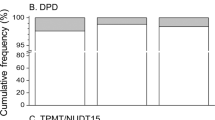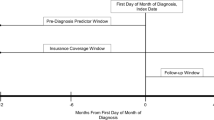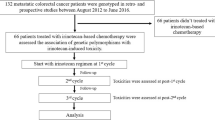Abstract
Inter-ethnic differences in drug handling and frequencies of pharmacogenetic variants are increasingly being characterized. In this study, we systematically assessed the feasibility of inferring ethnic trends in chemotherapy outcomes from inter-ethnic differences in pharmacogenetic variant frequencies. Frequencies of 51 variants and chemotherapy outcomes of East Asian and Caucasian colorectal cancer patients on standard chemotherapy regimens were summarized by meta-analyses, and variant frequencies were validated by MassARRAY analysis. Inferences of relative chemotherapy outcomes were made by considering minor allele function and population differences in their frequency. Significant population differences in genotype distributions were observed for 13/23 (60%) and 27/35 (77%) variants in the meta-analyses and validation series, respectively. Across chemotherapy regimens, East Asians had lower rates of grade 3/4 toxicity for diarrhea and stomatitis/mucositis than Caucasians, which was correctly inferred from 13/18 (72%, P=0.018) informative genetic variants. With appropriate variant selection, inferring relative population toxicity rates from population genotype differences may be relevant.
This is a preview of subscription content, access via your institution
Access options
Subscribe to this journal
Receive 6 print issues and online access
$259.00 per year
only $43.17 per issue
Buy this article
- Purchase on Springer Link
- Instant access to full article PDF
Prices may be subject to local taxes which are calculated during checkout

Similar content being viewed by others
References
Haller DG, Cassidy J, Clarke SJ, Cunningham D, Van Cutsem E, Hoff PM et al. Potential regional differences for the tolerability profiles of fluoropyrimidines. J Clin Oncol 2008; 26: 2118–2123.
Ma BB, Hui EP, Mok TS . Population-based differences in treatment outcome following anticancer drug therapies. Lancet Oncol 2010; 11: 75–84.
Shirao K, Hoff PM, Ohtsu A, Loehrer PJ, Hyodo I, Wadler S et al. Comparison of the efficacy, toxicity, and pharmacokinetics of a uracil/tegafur (UFT) plus oral leucovorin (LV) regimen between Japanese and American patients with advanced colorectal cancer: joint United States and Japan study of UFT/LV. J Clin Oncol 2004; 22: 3466–3474.
Gandara DR, Kawaguchi T, Crowley J, Moon J, Furuse K, Kawahara M et al. Japanese-US common-arm analysis of paclitaxel plus carboplatin in advanced non-small-cell lung cancer: a model for assessing population-related pharmacogenomics. J Clin Oncol 2009; 27: 3540–3546.
Lee SC, Ng SS, Oldenburg J, Chong PY, Rost S, Guo JY et al. Interethnic variability of warfarin maintenance requirement is explained by VKORC1 genotype in an Asian population. Clin Pharmacol Ther 2006; 79: 197–205.
O’Donnell PH, Dolan ME . Cancer pharmacoethnicity: ethnic differences in susceptibility to the effects of chemotherapy. Clin Cancer Res 2009; 15: 4806–4814.
Huang SM, Temple R . Is this the drug or dose for you? Impact and consideration of ethnic factors in global drug development, regulatory review, and clinical practice. Clin Pharmacol Ther 2008; 84: 287–294.
The International HapMap Project. Nature 2003; 426: 789–796.
1000 Genomes Project Consortium. A map of human genome variation from population-scale sequencing. Nature 2010; 467: 1061–1073.
Funke S, Brenner H, Chang-Claude J . Pharmacogenetics in colorectal cancer: a systematic review. Pharmacogenomics 2008; 9: 1079–1099.
Arand M, Muhlbauer R, Hengstler J, Jager E, Fuchs J, Winkler L et al. A multiplex polymerase chain reaction protocol for the simultaneous analysis of the glutathione S-transferase GSTM1 and GSTT1 polymorphisms. Anal Biochem 1996; 236: 184–186.
Kawakami K, Watanabe G . Identification and functional analysis of single nucleotide polymorphism in the tandem repeat sequence of thymidylate synthase gene. Cancer Res 2003; 63: 6004–6007.
Amador ML, Oppenheimer D, Perea S, Maitra A, Cusatis G, Iacobuzio-Donahue C et al. An epidermal growth factor receptor intron 1 polymorphism mediates response to epidermal growth factor receptor inhibitors. Cancer Res 2004; 64: 9139–9143.
McLeod HL, Sargent DJ, Marsh S, Green EM, King CR, Fuchs CS et al. Pharmacogenetic predictors of adverse events and response to chemotherapy in metastatic colorectal cancer: results from North American Gastrointestinal Intergroup Trial N9741. J Clin Oncol 2010; 28: 3227–3233.
Stephens M, Smith NJ, Donnelly P . A new statistical method for haplotype reconstruction from population data. Am J Hum Genet 2001; 68: 978–989.
Higgins JP, Thompson SG, Deeks JJ, Altman DG . Measuring inconsistency in meta-analyses. BMJ 2003; 327: 557–560.
Munafo MR, Clark TG, Flint J . Assessing publication bias in genetic association studies: evidence from a recent meta-analysis. Psychiatry Res 2004; 129: 39–44.
Kiyohara C, Yoshimasu K . Genetic polymorphisms in the nucleotide excision repair pathway and lung cancer risk: a meta-analysis. Int J Med Sci 2007; 4: 59–71.
Carlini LE, Meropol NJ, Bever J, Andria ML, Hill T, Gold P et al. UGT1A7 and UGT1A9 polymorphisms predict response and toxicity in colorectal cancer patients treated with capecitabine/irinotecan. Clin Cancer Res 2005; 11: 1226–1236.
Hansen TF, Garm Spindler KL, Andersen RF, Lindebjerg J, Brandslund I, Jakobsen A . The predictive value of genetic variations in the vascular endothelial growth factor A gene in metastatic colorectal cancer. Pharmacogenomics J 2010; 11: 53–60.
Kim JG, Chae YS, Sohn SK, Moon JH, Ryoo HM, Bae SH et al. Prostaglandin synthase 2/cyclooxygenase 2 (PTGS2/COX2) 8473T>C polymorphism associated with prognosis for patients with colorectal cancer treated with capecitabine and oxaliplatin. Cancer Chemother Pharmacol 2009; 64: 953–960.
Kweekel DM, Antonini NF, Nortier JW, Punt CJ, Gelderblom H, Guchelaar HJ . Explorative study to identify novel candidate genes related to oxaliplatin efficacy and toxicity using a DNA repair array. Br J Cancer 2009; 101: 357–362.
Ribelles N, Lopez-Siles J, Sanchez A, Gonzalez E, Sanchez MJ, Carabantes F et al. A carboxylesterase 2 gene polymorphism as predictor of capecitabine on response and time to progression. Curr Drug Metab 2008; 9: 336–343.
Spindler KL, Andersen RF, Jensen LH, Ploen J, Jakobsen A . EGF61A>G polymorphism as predictive marker of clinical outcome to first-line capecitabine and oxaliplatin in metastatic colorectal cancer. Ann Oncol 2009; 21: 535–539.
Han HS, Reis IM, Zhao W, Kuroi K, Toi M, Suzuki E et al. Racial differences in acute toxicities of neoadjuvant or adjuvant chemotherapy in patients with early-stage breast cancer. Eur J Cancer 2011; 47: 2537–2545.
Chavez-Macgregor M, Litton J, Chen H, Giordano SH, Hudis CA, Wolff AC et al. Pathologic complete response in breast cancer patients receiving anthracycline- and taxane-based neoadjuvant chemotherapy: evaluating the effect of race/ethnicity. Cancer 2010; 116: 4168–4177.
Caudle AS, Gonzalez-Angulo AM, Hunt KK, Liu P, Pusztai L, Symmans WF et al. Predictors of tumor progression during neoadjuvant chemotherapy in breast cancer. J Clin Oncol 2010; 28: 1821–1828.
Hershman DL, Unger JM, Barlow WE, Hutchins LF, Martino S, Osborne CK et al. Treatment quality and outcomes of African American versus white breast cancer patients: retrospective analysis of Southwest Oncology studies S8814/S8897. J Clin Oncol 2009; 27: 2157–2162.
Mack CD, Carpenter W, Meyer AM, Sanoff H, Sturmer T . Racial disparities in receipt and comparative effectiveness of oxaliplatin for stage III colon cancer in older adults. Cancer 2011; Nov: 9.
Farley JH, Tian C, Rose GS, Brown CL, Birrer M, Maxwell GL . Race does not impact outcome for advanced ovarian cancer patients treated with cisplatin/paclitaxel: an analysis of Gynecologic Oncology Group trials. Cancer 2009; 115: 4210–4217.
Farley JH, Tian C, Rose GS, Brown CL, Birrer M, Risinger JI et al. Chemotherapy intensity and toxicity among black and white women with advanced and recurrent endometrial cancer: a Gynecologic Oncology Group Study. Cancer 2009; 116: 355–361.
Polite BN, Sing A, Sargent DJ, Grothey A, Berlin J, Kozloff M et al. Exploring racial differences in outcome and treatment for metastatic colorectal cancer: Results from a large prospective observational cohort study (BRiTE). Cancer 2011; 118: 1083–1090.
Sanoff HK, Sargent DJ, Green EM, McLeod HL, Goldberg RM . Racial differences in advanced colorectal cancer outcomes and pharmacogenetics: a subgroup analysis of a large randomized clinical trial. J Clin Oncol 2009; 27: 4109–4115.
Yothers G, Sargent DJ, Wolmark N, Goldberg RM, O’Connell MJ, Benedetti JK et al. Outcomes among black patients with stage II and III colon cancer receiving chemotherapy: an analysis of ACCENT adjuvant trials. J Natl Cancer Inst 2011; 103: 1498–1506.
Sharib JM, Cyrus J, Horvai A, Gray Hazard FK, Neuhaus J, Matthay KK et al. Predictors of acute chemotherapy-associated toxicity in patients with Ewing sarcoma. Pediatr Blood Cancer 2011; Dec: 16.
Soo RA, Loh M, Mok TS, Ou SH, Cho BC, Yeo WL et al. Ethnic differences in survival outcome in patients with advanced stage non-small cell lung cancer: results of a meta-analysis of randomized controlled trials. J Thorac Oncol 2011; 6: 1030–1038.
Longnecker DS, Karagas MR, Tosteson TD, Mott LA . Racial differences in pancreatic cancer: comparison of survival and histologic types of pancreatic carcinoma in Asians, blacks, and whites in the United States. Pancreas 2000; 21: 338–343.
Balboa E, Duran G, Lamas MJ, Gomez-Caamano A, Celeiro-Munoz C, Lopez R et al. Pharmacogenetic analysis in neoadjuvant chemoradiation for rectal cancer: high incidence of somatic mutations and their relation with response. Pharmacogenomics 2010; 11: 747–761.
Loupakis F, Cremolini C, Fioravanti A, Orlandi P, Salvatore L, Masi G et al. Pharmacodynamic and pharmacogenetic angiogenesis-related markers of first-line FOLFOXIRI plus bevacizumab schedule in metastatic colorectal cancer. Br J Cancer 2011; 104: 1262–1269.
Boige V, Mendiboure J, Pignon JP, Loriot MA, Castaing M, Barrois M et al. Pharmacogenetic assessment of toxicity and outcome in patients with metastatic colorectal cancer treated with LV5FU2, FOLFOX, and FOLFIRI: FFCD 2000-05. J Clin Oncol 2010; 28: 2556–2564.
Cote JF, Kirzin S, Kramar A, Mosnier JF, Diebold MD, Soubeyran I et al. UGT1A1 polymorphism can predict hematologic toxicity in patients treated with irinotecan. Clin Cancer Res 2007; 13: 3269–3275.
Marsh S, Paul J, King CR, Gifford G, McLeod HL, Brown R . Pharmacogenetic assessment of toxicity and outcome after platinum plus taxane chemotherapy in ovarian cancer: the Scottish Randomised Trial in Ovarian Cancer. J Clin Oncol 2007; 25: 4528–4535.
Economopoulos KP, Sergentanis TN . GSTM1, GSTT1, GSTP1, GSTA1 and colorectal cancer risk: a comprehensive meta-analysis. Eur J Cancer 2010; 46: 1617–1631.
Taioli E, Garza MA, Ahn YO, Bishop DT, Bost J, Budai B et al. Meta- and pooled analyses of the methylenetetrahydrofolate reductase (MTHFR) C677T polymorphism and colorectal cancer: a HuGE-GSEC review. Am J Epidemiol 2009; 170: 1207–1221.
Etienne MC, Chazal M, Laurent-Puig P, Magne N, Rosty C, Formento JL et al. Prognostic value of tumoral thymidylate synthase and p53 in metastatic colorectal cancer patients receiving fluorouracil-based chemotherapy: phenotypic and genotypic analyses. J Clin Oncol 2002; 20: 2832–2843.
Bibikova M, Lin Z, Zhou L, Chudin E, Garcia EW, Wu B et al. High-throughput DNA methylation profiling using universal bead arrays. Genome Res 2006; 16: 383–393.
Chuah B, Goh BC, Lee SC, Soong R, Lau F, Mulay M et al. Comparison of the pharmacokinetics and pharmacodynamics of S-1 between Caucasian and East Asian patients. Cancer Sci 2011; 102: 478–483.
Iacopetta B . Methyl-group metabolism and the response of colorectal cancer to 5-fluorouracil. Crit Rev Oncog 2006; 12: 115–126.
Woude GFV, Klein G. Advances in Cancer Research. Academic Press: Salt Lake City, 2010.
Chua W, Kho PS, Moore MM, Charles KA, Clarke SJ . Clinical, laboratory and molecular factors predicting chemotherapy efficacy and toxicity in colorectal cancer. Crit Rev Oncol Hematol 2011; 79: 224–250.
Onay VU, Briollais L, Knight JA, Shi E, Wang Y, Wells S et al. SNP-SNP interactions in breast cancer susceptibility. BMC Cancer 2006; 6: 114.
Peters BJ, Rodin AS, Klungel OH, van Duijn CM, Stricker BH, van’t Slot R et al. Pharmacogenetic interactions between ABCB1 and SLCO1B1 tagging SNPs and the effectiveness of statins in the prevention of myocardial infarction. Pharmacogenomics 2011; 11: 1065–1076.
Shimoyama S . Pharmacogenetics of irinotecan: An ethnicity-based prediction of irinotecan adverse events. World J Gastrointest Surg 2010; 2: 14–21.
Hoffmeyer S, Burk O, von Richter O, Arnold HP, Brockmoller J, Johne A et al. Functional polymorphisms of the human multidrug-resistance gene: multiple sequence variations and correlation of one allele with P-glycoprotein expression and activity in vivo. Proc Natl Acad Sci USA 2000; 97: 3473–3478.
Nakamura T, Sakaeda T, Horinouchi M, Tamura T, Aoyama N, Shirakawa T et al. Effect of the mutation (C3435T) at exon 26 of the MDR1 gene on expression level of MDR1 messenger ribonucleic acid in duodenal enterocytes of healthy Japanese subjects. Clin Pharmacol Ther 2002; 71: 297–303.
Johnson MR, Wang K, Diasio RB . Profound dihydropyrimidine dehydrogenase deficiency resulting from a novel compound heterozygote genotype. Clin Cancer Res 2002; 8: 768–774.
Weisberg I, Tran P, Christensen B, Sibani S, Rozen R . A second genetic polymorphism in methylenetetrahydrofolate reductase (MTHFR) associated with decreased enzyme activity. Mol Genet Metab 1998; 64: 169–172.
Horie N, Aiba H, Oguro K, Hojo H, Takeishi K . Functional analysis and DNA polymorphism of the tandemly repeated sequences in the 5′-terminal regulatory region of the human gene for thymidylate synthase. Cell Struct Funct 1995; 20: 191–197.
Mandola MV, Stoehlmacher J, Zhang W, Groshen S, Yu MC, Iqbal S et al. A 6 bp polymorphism in the thymidylate synthase gene causes message instability and is associated with decreased intratumoral TS mRNA levels. Pharmacogenetics 2004; 14: 319–327.
Suchi M, Mizuno H, Kawai Y, Tsuboi T, Sumi S, Okajima K et al. Molecular cloning of the human UMP synthase gene and characterization of point mutations in two hereditary orotic aciduria families. Am J Hum Genet 1997; 60: 525–539.
Wang D, Sadee W . Searching for polymorphisms that affect gene expression and mRNA processing: example ABCB1 (MDR1). The AAPS journal 2006; 8: E515–E520.
Kuehl P, Zhang J, Lin Y, Lamba J, Assem M, Schuetz J et al. Sequence diversity in CYP3A promoters and characterization of the genetic basis of polymorphic CYP3A5 expression. Nat Genet 2001; 27: 383–391.
Coles BF, Morel F, Rauch C, Huber WW, Yang M, Teitel CH et al. Effect of polymorphism in the human glutathione S-transferase A1 promoter on hepatic GSTA1 and GSTA2 expression. Pharmacogenetics 2001; 11: 663–669.
Board PG . Genetic polymorphisms of glutathione S-transferases in man. In: Hayes JD PC, Mantle TJ (ed). Glutathione S-transferases and drug resistance. Taylor and Francis: London, 1990, pp 232–241.
Ali-Osman F, Akande O, Antoun G, Mao JX, Buolamwini J . Molecular cloning, characterization, and expression in Escherichia coli of full-length cDNAs of three human glutathione S-transferase Pi gene variants. Evidence for differential catalytic activity of the encoded proteins. J Biol Chem 1997; 272: 10004–10012.
Pemble S, Schroeder KR, Spencer SR, Meyer DJ, Hallier E, Bolt HM et al. Human glutathione S-transferase theta (GSTT1): cDNA cloning and the characterization of a genetic polymorphism. Biochem J 1994; 300 (Part 1): 271–276.
Peterkin VC, Bauman JN, Goosen TC, Menning L, Man MZ, Paulauskis JD et al. Limited influence of UGT1A1*28 and no effect of UGT2B7*2 polymorphisms on UGT1A1 or UGT2B7 activities and protein expression in human liver microsomes. Br J Clin Pharmacol 2007; 64: 458–468.
Purdue PE, Lumb MJ, Allsop J, Danpure CJ . An intronic duplication in the alanine: glyoxylate aminotransferase gene facilitates identification of mutations in compound heterozygote patients with primary hyperoxaluria type 1. Hum Genet 1991; 87: 394–396.
Moriai T, Kobrin MS, Hope C, Speck L, Korc M . A variant epidermal growth factor receptor exhibits altered type alpha transforming growth factor binding and transmembrane signaling. Proc Natl Acad Sci USA 1994; 91: 10217–10221.
Gebhardt F, Zanker KS, Brandt B . Modulation of epidermal growth factor receptor gene transcription by a polymorphic dinucleotide repeat in intron 1. J Biol Chem 1999; 274: 13176–13180.
Yu JJ, Lee KB, Mu C, Li Q, Abernathy TV, Bostick-Bruton F et al. Comparison of two human ovarian carcinoma cell lines (A2780/CP70 and MCAS) that are equally resistant to platinum, but differ at codon 118 of the ERCC1 gene. Int J Oncol 2000; 16: 555–560.
Lunn RM, Helzlsouer KJ, Parshad R, Umbach DM, Harris EL, Sanford KK et al. XPD polymorphisms: effects on DNA repair proficiency. Carcinogenesis 2000; 21: 551–555.
Hull J, Thomson A, Kwiatkowski D . Association of respiratory syncytial virus bronchiolitis with the interleukin 8 gene region in UK families. Thorax 2000; 55: 1023–1027.
Acknowledgements
This work was supported by the National Medical Research Council (NMRC/1123/2007) of Singapore.
Author information
Authors and Affiliations
Corresponding author
Ethics declarations
Competing interests
The authors declare no conflict of interest.
Additional information
This work was supported by the National Medical Research Council (NMRC/1123/2007) of Singapore.
Supplementary information
PowerPoint slides
Rights and permissions
About this article
Cite this article
Loh, M., Chua, D., Yao, Y. et al. Can population differences in chemotherapy outcomes be inferred from differences in pharmacogenetic frequencies?. Pharmacogenomics J 13, 423–429 (2013). https://doi.org/10.1038/tpj.2012.26
Received:
Revised:
Accepted:
Published:
Issue Date:
DOI: https://doi.org/10.1038/tpj.2012.26
Keywords
This article is cited by
-
Pharmacogenetics-Guided Phase I Study of Capecitabine on an Intermittent Schedule in Patients with Advanced or Metastatic Solid Tumours
Scientific Reports (2016)
-
Pharmacogenomic diversity in Singaporean populations and Europeans
The Pharmacogenomics Journal (2014)



